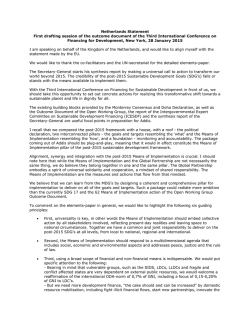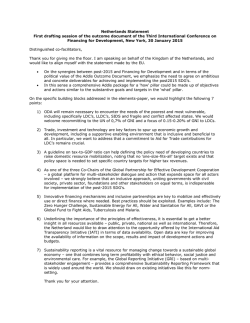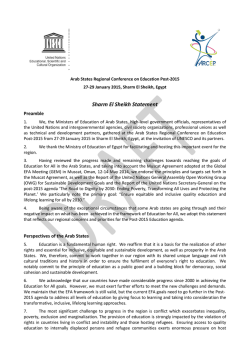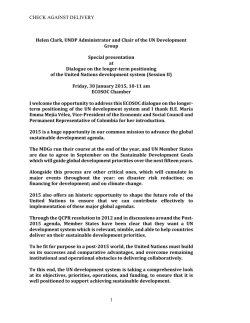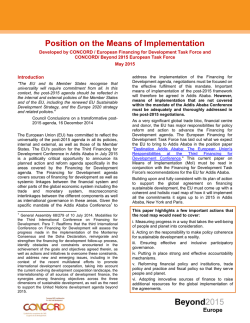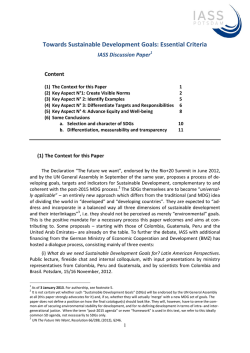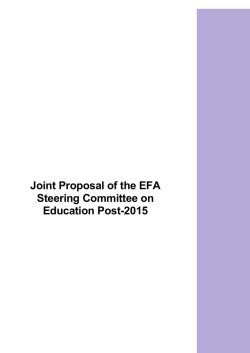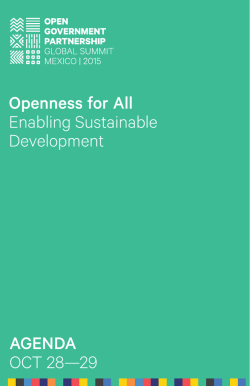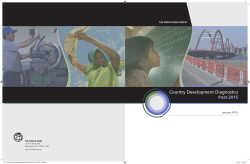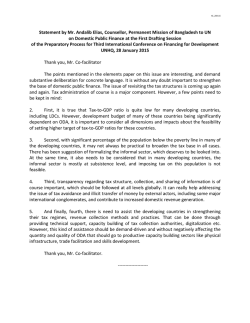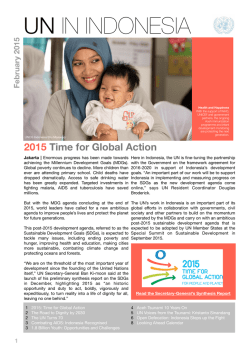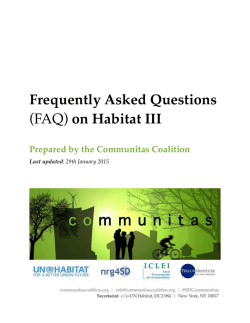
Statement for the Post-2015 - United Cities and Local Governments
Statement for the Post-2015 Development Agenda negotiations 21 January 2015 – UNHQ, New-York Read by Aliye Celik, UCLG representative on behalf of the LAMG and the GTF Dear Co-Chairs, Dear Member States, colleagues, First allow us to praise the opportunities offered for exchanges with Member States. In view of the approaching deadline we would like to emphasize the need for an inclusive process, including Major Groups and other stakeholders, following the precedent of the Open Working Group. We would also like to stress the need to ensure a single integrated agenda and to link all existing processes related to the Post-2015 development agenda, in particular the climate change one, to avoid lack of ambition. We further welcome and support the emerging consensus among Member States to work on the 17 goals that were proposed by the Open Working Group. Main priorities The Post-2015 agenda should address the challenges and opportunities of our increasingly urbanised world while ensuring a rural-urban continuum through a local and territorial development approach. As such, our two main priorities are: A stand-alone ‘urban’ goal, as embodied in SDG11, and A wider ‘localizing’ agenda that identifies a range of goals and targets that could be adopted at sub-national level. Means of Implementation and Global Partnership for Sustainable Development The post-2015 process should provide a clear vision to the implementation of Rio+20 outcomes which recognise the role of local and subnational governments, and should define mechanisms to maximize their potential at the national and global levels. Localizing the SDGs The concept of localizing the SDGs was extensively considered during the UN Global Consultation on “localizing the Post-2015 Agenda”, which stressed in the final communique: “The implementation of the Post-2015 Agenda will greatly depend on local action and leadership, in coordination with all other levels of governance. Any new development agenda will only have an impact on people’s lives if it is successfully implemented at the local level” We agree that there is a need to develop alternative measurements of progress that go beyond GDP. These indicators should be clearly disaggregated to include urban areas and territories, as this is the only way to identify the most vulnerable groups of the population and ensure that no-one is left behind. Fiscal decentralization We would also like to raise the necessity to improve local and subnational authorities’ access to resource and remind the need to strengthen subnational governments’ institutional environment and capacity to attract longterm investments and developing “fiscal decentralization”. Capacity building We fully support the call of the UNSG to strengthen the institutional and human capacities of local governments to assess needs, collect data and formulate responses across sectors and institutions to ensure the implementation of the agenda at local level. We recall, however, that, as a sphere of government, local and subnational authorities are also responsible for policy making. Monitoring and evaluation Finally, we welcome the idea of a monitoring, evaluation and reporting process based on country-led accountability and built on existing national and local mechanisms and processes, with broad multi-stakeholder participation, including local and subnational governments. This multi-stakeholder, participatory approach should be integrated at all levels, including within the HLPF where there should be regular consultation of all Major Groups. Conclusion To conclude, we would like to underline the importance in the coming months of negotiations on the Agenda of 1) maintaining Goal 11 on sustainable cities and human settlements, 2) ‘localizing’ the targets and indicators of the Agenda so that the diverse development challenges at sub-national level can be addressed and monitored, and 3) recognizing the essentially local nature of development and empowering local and subnational governments and communities with the resources they need to make the new Agenda a reality on the ground.
© Copyright 2026
